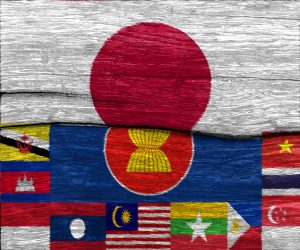Many major Southeast Asian countries in ASEAN, such as Indonesia and Malaysia, are concerned and anxious about the established security pact between Australia, the United Kingdom, and the United States (AUKUS) to provide Australia with nuclear-powered submarines.
ASEAN countries have had varied responses to the pact. Some Southeast Asians fear that AUKUS will intensify the arms race in the Indo-Pacific, thus leading to a worsening security dilemma in the region. Some implicitly supported AUKUS, and some have remained silent.
This insecurity and different voices among ASEAN members arose due to AUKUS featuring big powers in the Indo-Pacific circuit. There is concern that ASEAN’s centrality and unity could be at risk.
On the other side, AUKUS proponents should understand these consequences and anxiety. As Southeast Asia is an important region in the Indo-Pacific, ensuring favorable relations and common ground with ASEAN states on AUKUS is vital.
Japan has a unique position to achieve this, thanks to two key advantages. On one side, Japan is a trustworthy “equal” partner to Southeast Asia, and enjoying a “heart-to-heart” relationship with the region under the approach laid out in the Fukuda Doctrine. Meanwhile, Japan not only supports AUKUS but is a major U.S. ally in Asia as well as a Quad member. Japan could help bridge the two sides.
Japan could use its natural friendship with ASEAN countries as the starting point to explain the perspective of AUKUS proponents. There are many channels both in the multilateral and bilateral contexts that Japan could utilize to provide a deeper understanding of AUKUS to ASEAN countries. Multilaterally, Japan has the Vientiane Vision with ASEAN and bilaterally, Japan has many defense exchanges with Southeast Asian countries.
By using these platforms, Japan should help Australia, the United States, and the United Kingdom to convince ASEAN countries that the security pact is not aimed at Southeast Asians but seeks to face regional security challenges. Even though ASEAN’s anxiety about a regional arms race and the risk of being divided will not be pacified instantly, such exchanges should at least enrich the perspective of Southeast Asians on AUKUS.
On the AUKUS side, Japan could propose that the proponents establish an institutionalized way of communication and dialogue with like-minded countries surrounding the AUKUS operating area, including with ASEAN. It should be understood that the cause of this regional tension, shock, and anxiety is the lack of clear information and transparent communication. Simply put, the ASEAN countries are feeling excluded. The surprised expression of ASEAN reflected the nuance that the establishment of AUKUS was discussed and planned exclusively among the allies, excluding ASEAN as an important regional partner in Indo-Pacific.
Though this is a hard mission for Japan to accomplish, it is an opportunity that will be worth the effort. Progress in bridging the two sides will increase Japan’s credibility with both ASEAN countries and the AUKUS members.
In the context of Japan-ASEAN relations, Japan is still undertaking the process to reintegrate itself into the international and regional community in the security, defense, and military realm after World War II. Serving as a trustworthy dialogue partner and “broker” to project ASEAN’s anxiety to AUKUS proponents will help Japan to earn more trust from ASEAN states, which will lead to more support for Japan being more active militarily.
On the other hand, should Japan prove unable to understand ASEAN’s aspiration to keep the region neutral, stable, and impartial, it would be counterproductive to Japan’s progress in maintaining the pacifist image among Southeast Asians after World War II.
It is in Japan’s best interest to get support from Southeast Asians to be more proactive in the security sector as Japan is also in urgent need to adjust to the severe changing security environment surrounding it.
Should Japan execute the task, it will also solidify Japan’s position within its alliance with the United States as well as among the Quad. Even though in military power and technology the United States is way above Japan, Japan will be seen as a rare partner that can communicate and maintain the trust of Southeast Asians, and thus significantly helpful to translate the United States’ and the Quad’s interests in the Indo-Pacific to be better understood by ASEAN countries.

































